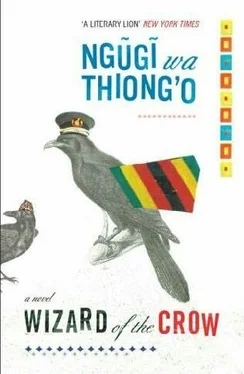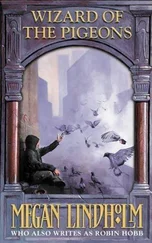In the heat of the moment they rushed to the district commissioner’s and filed for divorce, parting company in less than a year of failed married bliss.
Nyawlra now found herself on a new road to freedom. Kaniürü felt he had lost his way to riches and never tired of trying to win her back.
Nyawlra started laughing as she recounted his pathetic attempts to Kamltl.
By now the two beggars were at table, enjoying a meal of ugali and collard greens Nyawlra had quickly prepared in the kitchen. Kamrö was inwardly grateful. He could not remember the last time he had eaten good home cooking, and it was with tremendous self-restraint that he did not gulp it all down.
The little house comprised a bedroom with a guitar hanging prominently on the wall, a sitting room, a kitchen, and a bathroom with a toilet and shower. The beggars had already washed themselves and changed, Kamltl into his job-seeking shirt and trousers and Nyawlra into a simple homely dress.
“And what does Kaniürü do now?” he asked her.
“I believe he is still a teacher at the Ruler’s Polytechnic. But you won’t believe this. I hear he recently became a member of the Ruler’s glorious youthwing that the Ruler talked about in his famous television address to the nation, following the incident of the snakes at the park, in an effort to attract the youth away from the propaganda of the Movement for the Voice of the People.”
“A new Aburlria, indeed,” Kamltl commented. “Even a college teacher a youthwinger!”
They were silent for a while.
“And how did you end up in the streets, begging?” Kamltl asked, wondering whether she shared his desperation. Or did the divorce from Kaniürü and the separation from her father have anything to do with it? “I would never have imagined meeting a university woman begging in the streets!”
“Weren’t you just talking about a new Aburlria? If fifty-year-old university professors are becoming the Ruler’s youthwingers, why can’t university graduates become beggars?”
“I didn’t mean university graduates in general, but women graduates. Like you, for instance.”
“Does rough weather choose men over women? Does the sun beat on men, leaving women nice and cool?” Nyawlra asked rather sharply. “Women bear the brunt of poverty. What choices does a woman have in life, especially in times of misery? She can marry or live with a man. She can bear children and bring them up, and be abused by her man. Have you read Buchi Emecheta of Nigeria, Joys of Motherhood} Tsitsi Dangarembga of Zimbabwe, say, Nervous Conditions’? Mariam Ba of Senegal, So Long a Letter? Three women from different parts of Africa, giving words to similar thoughts about the condition of women in Africa.”
“I am not much of a reader of fiction,” Kamltl said. “Especially novels by African women. In India such books are hard to find.”
“Surely even in India there are women writers? Indian women writers?” Nyawlra pressed. “Arundhati Roy, for instance, The God of Small Things’? Meena Alexander, Fault Lines’? Susie Tharu. Read Women Writing in India. Or her other book, We Were Making History, about women in the struggle!”
“I have sampled the epics of Indian literature,” Kamltl said, trying to redeem himself. “Mahabharata, Ramayana, and mostly Bhagavad Gita. There are a few others, what they call Purana, Rig-Veda, Upanishads… Not that I read everything, but…”
“I am sure that those epics and Puranas, even the Gita, were all written by men,” Nyawlra said. “The same men who invented the caste system. When will you learn to listen to the voices of women?”
“To be very frank,” Kamltl said, trying to steer the talk away from the subject of women writers, “the books that most fascinate me are those about Egypt and Ethiopia, the entire area of the Nile, the Red Sea, and the coastline. I have a theory that the coastline of the Indian Ocean was once a cultural highway with constant migrations and exchange. There are hardly any women who write about that. I will start reading books by women writers. Perhaps you can recommend some. But you did not answer my question. What were you doing in beggars’ clothes at the Ruler’s Square?”
“What about you?” Nyawlra asked. “What were you doing there?”
Before Kamltl could answer, she was laughing again, as if a new thought had seized her.
“What is it?” Kamltl asked. Was her laughter at the expense of his ignorance about women writers?
“It occurred to me as you were talking about Egypt and Ethiopia… how did you become so knowledgeable about witchcraft and magic potions?” she managed to say in between bouts of laughter.
At the mention of his foray into magic, and remembering the look on the police officer’s face, Kamltl, too, broke into hysterics.
“When we were children we used to play witchcraft. We would stick a wooden spike through a bundle of leaves, a dead frog or lizard, and one or two Sodom apples and then plant the spike in a path. From a safe distance we kept an eye on it, and what excited us most was to see adults, grown men and women, avoiding any contact with the bundle. Some would even take a step or two back, then give it a wide berth. Nobody dared touch it; there were times when the bundle remained in place, Lord knows, for days.
“Just outside the village was a big orchard of plums, pears, mangoes, oranges, tangerines, and lemons, and whenever we passed anywhere near this garden of Eden, the landowner would set his dogs on us children so that we would not steal his fruit. Some of the children did actually find a way of climbing over the fence; they would come back with their pockets bulging with fruit. Still, we did not like his chasing us with dogs on a public path, and we hated even more that he took us all to be thieves deserving of punishment whether we had stolen anything or not. One day we decided to test our witch power on our tormenter. We prepared the magic bundle in the same way but made it more potent. To the dead frogs and Sodom apples and leaves we added dead chameleons and planted the wood spike in a corner of the orchard where passersby could see it.
“Well, it did work, a bit too well for our comfort. The farmer was so terrified that he hired the services of a witch doctor to undo the power of the evil no doubt planted in his land by envious rivals. His countermeasure did not help, for people were now afraid of getting caught between two contending magics. Word spread so that wholesale buyers and retailers from other areas refused to touch the man’s fruit.
“He was saved from ruin by an Indian buyer who said that African magic was no match for Indian magic and bought the fruits at the price of damaged goods. He claimed that he was going to spend more money getting the fruits cleansed with potent potions imported directly from India.
“At first we the magic workers were happy about our success and thought that we were cleverer than the adults and all the professional witch doctors because we had fooled them all. But, thinking that our parents, who also hated the landlord, would be happy, we let them in on our triumphs. The thrashing we got removed all thoughts of our ever dabbling in witchcraft again, until tonight.”
“Why did they beat you, for indulging in witchcraft or for using it to ruin the landlord?”
“Probably both; how dare children do that to an adult and a neighbor at that, but I think more for playing at witchcraft. Who knows? Even innocent deeds by babes might excite dangerous spirits from the netherworld to come and haunt the living. Whatever the case, we should have known that our parents were unlikely to say to us, Thank you for your ambition to become witch doctors.”
Читать дальше












